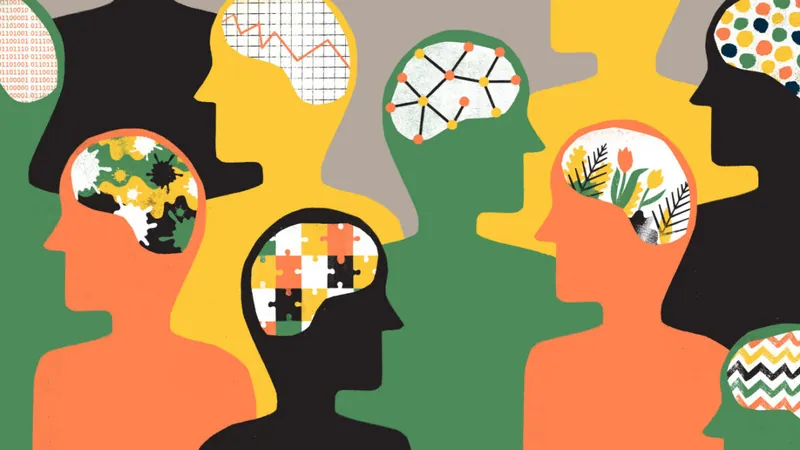
Unlocking AI: The Unexpected Game-Changer for Neurodiverse Workers
2025-09-09
Author: Wai
As tech giants tout AI as the ultimate productivity booster, a groundbreaking UK government study uncovers a surprising revelation: neurodiverse employees are reaping far greater rewards from AI tools like chatbots compared to their neurotypical peers.
The UK's Department for Business and Trade recently evaluated its trial of Microsoft 365 Copilot. The results? While overall user satisfaction stood at a commendable 72%, neurodiverse employees scored a staggering satisfaction rate that hinted at a new frontier of workplace inclusion.
Leveling the Playing Field with AI
One participant with ADHD described the transformative power of Copilot: "It leveled the playing field." Another, facing challenges with dyslexia, expressed newfound confidence in report writing, which had formerly been a daunting task. A third dyslexic participant emphasized that Copilot offered more assistance than traditional tools by being integrated into existing applications, eliminating the need for clunky extra software.
Beyond Neurodiversity: A Boost for All
The advantages don’t stop at neurodiversity. Users with hearing impairments noted the significant impact of AI-powered transcription services, allowing them to engage more fully in discussions without the anxiety of missing key points during meetings. "I can share my inputs quickly rather than sitting quietly and wondering if I missed something important," one user shared.
A Study that Highlights New Possibilities
Titled "The Evaluation of the M365 Copilot Pilot in the Department for Business and Trade," the study conducted between October 2024 and March 2025 involved 300 participants out of 1,000 licenses distributed. Despite some skepticism regarding productivity gains, the report highlights how AI tools might uniquely address accessibility gaps long overlooked by standard workplace accommodations.
AI's Role Beyond Conventional Productivity
While some critiques have emerged about the limitations of these AI tools in improving traditional productivity metrics, the findings suggest a crucial insight: AI excels not just by outperforming human capabilities but by creating opportunities for those at a disadvantage. For instance, the difference between completing a report 20% faster and simply being able to write one at all is monumental for many.
The Power of AI for Disability Support
For individuals with dyslexia and ADHD, AI might serve as an invaluable aid, helping with everything from writing structure to organizing chaotic thoughts. Users have reported using AI to combat procrastination, creating a sense of order in their tasks—an absolute game-changer for managing ADHD symptoms.
"AI can help us sort through ideas so that we feel more prepared and confident in our communications," shared Lena, a reader from ADDitude magazine.
Innovative Support for Visual Impairments
Similarly, AI tools are revolutionizing support for those with visual impairments, enabling them to summarize visual content and reformat information—a feat that would have seemed futuristic just a few years ago.
Stealth Accommodations: The Double-Edged Sword
AI language tools are offering stealth accommodations for students who may not have formal diagnoses or require special equipment. However, users must remain cautious; the risk of encountering inaccurate AI outputs poses a significant challenge, especially when essential tasks depend on reliability.
Navigating the Transition Away from AI
As the pilot study closed in December 2024, many participants faced challenges reintegrating into a tech-less work environment—especially those with disabilities who had relied heavily on AI for enhanced accessibility. With no clear future steps announced by the department, users are left in a precarious position.
In conclusion, as we stand on the brink of an AI-driven future, it’s evident that accessibility features might just be the most impactful application of this technology, illuminating a critical path toward greater inclusion in the workplace.




 Brasil (PT)
Brasil (PT)
 Canada (EN)
Canada (EN)
 Chile (ES)
Chile (ES)
 Česko (CS)
Česko (CS)
 대한민국 (KO)
대한민국 (KO)
 España (ES)
España (ES)
 France (FR)
France (FR)
 Hong Kong (EN)
Hong Kong (EN)
 Italia (IT)
Italia (IT)
 日本 (JA)
日本 (JA)
 Magyarország (HU)
Magyarország (HU)
 Norge (NO)
Norge (NO)
 Polska (PL)
Polska (PL)
 Schweiz (DE)
Schweiz (DE)
 Singapore (EN)
Singapore (EN)
 Sverige (SV)
Sverige (SV)
 Suomi (FI)
Suomi (FI)
 Türkiye (TR)
Türkiye (TR)
 الإمارات العربية المتحدة (AR)
الإمارات العربية المتحدة (AR)